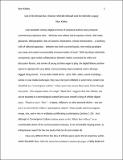Out of the Bread Box: Eleanor Melville Metcalf and the Melville Legacy
Author(s)
Kelley, Wyn
DownloadKelley_Out of the bread.pdf (187.4Kb)
PUBLISHER_POLICY
Publisher Policy
Article is made available in accordance with the publisher's policy and may be subject to US copyright law. Please refer to the publisher's site for terms of use.
Terms of use
Metadata
Show full item recordAbstract
Late-twentieth-century digital archives of canonical authors have produced uncommonly expansive texts. Whereas once editors had to squeeze a book, with notes, glossaries, bibliographies, lists of variants, illustrations, critical introductions—a clanking hulk of editorial apparatus—between two cloth-covered boards, new media paradigms can create and sustain inconceivably immense bodies of work. With dazzling multimedia components, open-ended collaborations between readers connected by wikis and discussion forums, and armies of young scholars eager to play, the digital literary archive seems to represent the very latest, most promising, least contained, and in all ways biggest thing around. Yet as older media forms—print, film, video, sound recordings—evolve in new media landscapes, they have met (and collided) in what Henry Jenkins has identified as a “convergence culture,” where users may access these many forms through one portal. This utopian notion of a single “Black Box” suggests that, like Hamlet, one can be bounded in a technological nutshell and count oneself a king of infinite digital space. Whatever one’s “Box”—a laptop, cellphone, or other personal device—one can use it to travel freely within a “participatory culture” where people and texts migrate, merge, mix, and re-mix in endlessly proliferating combinations (Jenkins 1-24). And although in Convergence Culture Jenkins points to the “Black Box Fallacy” as an unachievable dream of the communications industry, it has remarkable staying power, as entrepreneurs search for the one device that can do and contain all.
Date issued
2011-03Department
Massachusetts Institute of Technology. Department of Humanities. Literature SectionJournal
Leviathan
Publisher
Wiley Blackwell
Citation
Kelley, Wyn. “Out of the Bread Box: Eleanor Melville Metcalf and the Melville Legacy.” Leviathan 13, no. 1 (March 2011): 21–33.
Version: Author's final manuscript
ISSN
15256995
1750-1849